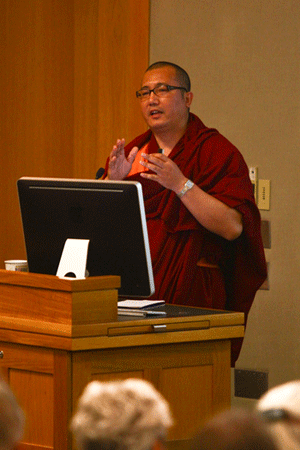
Tibetan medical practices’ inclusion of Buddhist religious principles has prevented them from being accepted by the Western medical community, several panelists argued in a discussion hosted Friday by the Zen Practice Group. The panelists, who contended that Western doctors should further explore Tibetan medical practices, discussed their research about Tibetan medicine, as well as their own personal experiences with the practice.
The panel was part of a weekend seminar that combined talks and discussions on Buddhism with opportunities for meditation led by Tibetan physician and Buddhist monk Kunchok Gyaltsen.
In the keynote presentation on Saturday, Gyaltsen described Buddhist theories on medicine and healing.
Gyaltsen opened his talk by explaining how Buddhism arrived in Tibet, saying that studying Tibetan medicine is important because millions of people throughout the Himalayan region and Mongolia follow its principles.
“Today, Tibetan medicine is completed in the sense that it has all the components to understand holistically the human body and mind,” he said, contrasting Tibetan medicine with Western medical philosophy in which the mind and body are considered separately.
In Tibetan medicine, the location of organs within the body are measured using one’s fingers, Gyaltsen said. The body is like a “cell” with four live elements — earth, water, fire and wind — that are separated by space that allows individuals to grow and mobilize, he said.
Gyaltsen described the four elements and their functions using the example of digestion.
“Ped kan is the function of mixing in the stomach,” he said. “It cannot function without heat or fire, which melts everything together in the stomach like a soup.”
In Buddhist medical understanding, everything has a function of hot or cold nature, he said. Gyaltsten explained the Buddhist belief that drinking ice water on an empty stomach destroys the heat in the stomach necessary to digest oily food.
In the panel on Friday, social and medical anthropologist Theresia Hofer explained the connection between traditional Tibetan medicine and spirituality, describing her experiences with a Buddhist doctor with whom she stayed in Tibet. The doctor did not participate in daily community religious rituals because he felt seeing patients sufficed as a religious practice, she said.
While earlier doctors only practiced traditional Buddhist medicine, contemporary Tibetan physicians employ both Buddhist practices and traditional Chinese biomedicine, as both are now taught in government colleges, according to Hofer, who is currently pursuing her doctorate at University College London.
There is great variety in traditional healers and how they heal, Hofer said, adding that Westerners should not assume all Tibetan doctors center their treatments around spirituality.
“Europeans and Americans are steeped in a long tradition of romanticizing Tibetans as more spiritual than other people,” she said. “We have to step outside this as much as possible, and this will allow us to see more clearly what the Tibetans we work with do and think of their religious practice.”
The most striking evidence of Buddhist ethics in medicine is that more traditional doctors often do not accept gifts or payments for their services because they believe their medical practices would lose spiritual merit if they are reimbursed, she said.
Eric Jacobsen, a medical anthropologist in the Department of Global Health and Social Medicine at Harvard Medical School, also shared his research on the connection between Tibetan medicine and religion.
Texts on medicine are introduced as teachings of the figure known in English as the “medicine Buddha,” he said. Tibetan doctors use Buddhist principles to explain diagnoses and treatments to patients, Jacobsen said. Because several of the country’s medical schools are located in monasteries, Tibetan medical training often includes Buddhist meditation practices, he said.
Many Tibetan patients also request that their medicine be blessed by a lama, which is further evidence of the focus on Buddhism in Tibetan medicine, he said.
Since many of the Tibetan doctors’ research methods have been below clinical standards in the United States and European Union, efforts to have their practices accepted by Western doctors have failed, according to Jacobsen.
“Is there any way to separate out the force of a blessing from a placebo force, and if there was a way to do it, would it be ethical?” he asked, adding that a solution still needs to be discovered.
Barbara Gerke, an anthropology professor visiting at Dartmouth, further explored the relationship between religion and medicine in Tibet by explaining a fasting practice known as “essence extraction,” or “chulen.” In the practice, an individual subsists on extractions from various plants while on an isolation retreat, she said.
“This is really a Tibetan practice that is right at the margin between religion and medicine,” she said.
Source : http://thedartmouth.com




